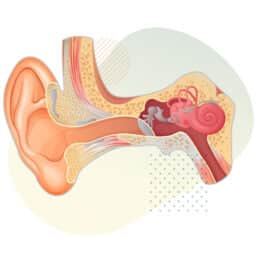Crowded Places and Hidden Hearing Loss

If you’ve ever been in a situation where you’re in an environment with lots of background noise—such as a party with loud music in the background or a crowded restaurant—and noticed that you’re having a lot of trouble following a conversation, that could be hidden hearing loss. What Is Hidden Hearing Loss? Hidden hearing loss,…
How to Host a Hearing-Inclusive Thanksgiving

Whether you’re hosting the big family Thanksgiving feast or an intimate “friendsgiving” dinner, it’s essential to consider the needs of your guests with hearing loss. For people with hearing loss, environments with lots of background noise and overlapping conversations can be complicated and overstimulating. We’ve compiled some expert tips for hosting people with hearing loss;…
Grocery Shopping with Hearing Loss

Hearing loss can make tasks in your everyday life a lot more challenging. This is especially true for grocery shopping. What seems like a small outing for groceries can turn into a stressful, overstimulating and frustrating experience for those with hearing loss. Challenges of Grocery Shopping with Hearing Loss Tips for Your Shopping Trip Given…
Understanding Residual Hearing

Residual hearing refers to the remaining ability of someone with hearing loss to hear certain sounds. This can vary from person to person and may include recognizing low-pitched sounds, certain speech frequencies or environmental noises. Even minimal residual hearing can significantly enhance communication abilities and improve quality of life, especially with appropriate support and technology….
Can Large or Swollen Lymph Nodes Affect Hearing

Swollen lymph nodes are typically associated with infections and other immune responses. Due to the proximity to the auditory system, swollen lymph nodes can potentially impact hearing. Swollen lymph nodes can affect hearing, but it’s not always a direct cause. Understanding the Anatomy: Lymph Nodes and the Ear Lymph nodes are small structures that help…
Addressing the Stigma Around Hearing Aid Use

Nearly 29 million people could benefit from using hearing aids, yet many people still hesitate to consider them. Much of this reluctance may stem from lingering misconceptions and outdated ideas that prevent people from seeking help. It’s time to address these concerns and reframe how we think about hearing aids. Why People Avoid Hearing Aids…
Integrating Hearing Aids with Modern Devices
Hearing aids today are advanced, tech-savvy devices that amplify hearing and connect users to the world around them. Nearly 28.8 million Americans could benefit from using hearing aids, but many don’t take advantage. Now, hearing aids can integrate with many technological devices people use every day, enhancing their convenience. Hearing Aids and Smartphones One of…
The Importance of Regular Hearing Evaluations

Hearing is one of our most vital senses, connecting us to the world around us. It plays a critical role in communication, safety, and social well-being. Yet, we don’t often give hearing care the same attention we give dental and optical care. Regular hearing checks are an important part of overall wellness, especially as we…
Navigating the Latest Hearing Aid Technologies

While nearly 28.8 million Americans could benefit from hearing aids, a large percentage of those people don’t use them. Hearing aids have come a long way from bulky devices and basic amplification. The latest hearing aid technologies are transforming the hearing aid experience toward more personalization than ever before. Here’s a look at five groundbreaking…
Impact of Hormones on Hearing Loss

Hormones influence many aspects of our health, including hearing. Fluctuations in hormone levels, particularly estrogen and progesterone, can affect the inner ear, potentially leading to hearing disturbances. The Role of Hormones in Hearing Hormones are chemical messengers that regulate critical functions throughout the body. Some studies indicate that estrogen, a hormone primarily associated with the…